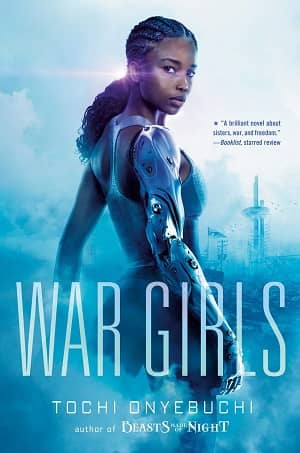Orbiting Colonies, Giant Mechs, and Child Soldiers: War Girls by Tochi Onyebuchi
 War Girls (Razorbill, 450 pages, $18.99, October 15, 2019)
War Girls (Razorbill, 450 pages, $18.99, October 15, 2019)
By Tochi Onyebuchi
Cover by Nekro
The facts that war is brutal, savage, and harms the innocent together with the guilty are no new revelations. Nor is it news that children in the 20th and 21st centuries have been suborned into brutal combat across the globe. Finally, no one is ignorant that technology continues, as it always has, to make war exponentially deadlier in its efficiency. What Tochi Oneybuchi has done with his powerful new novel War Girls is to combine these knowns into a story of love and sisterhood that together cross political and social divides and battlefields alike, and where traumatized soldiers dream of a true peace in a thriving, reborn nation. War Girls is a novel of intense, determined hope in the face of overwhelming obstacles; in this current historical moment it’s exactly the book we need.
In 2172, the world is a damaged place. Climate change and war have destroyed much of the Earth, and millions have fled the planet to live in orbiting Colonies. Nigeria is a country rent by turmoil, where the breakaway southeastern province of Biafra has formed its own nation (as it did in real life between 1967-1970) and battles Nigeria to secure its independence. The war has left much of the area saturated in radioactivity that kills or mutates the local wildlife, and battles are fought using unmanned drones, human-piloted mechs, and augmented soldiers refitted with bionic limbs.
Onyii is such a soldier, a young woman and war hero who lives to protect both her new nation and her adopted orphaned sister Ify. When the two become separated through the usual vagaries of war, they find themselves on opposite sides of the conflict. Much of the novel shows the ways in which the two sisters see the war from different angles – Onyii as an embattled Biafran war hero who must realize the consequences of her past actions, and Ify having to face her own traumatic past while embedded deep within the Nigerian military establishment.
Part of the greatness of this book lies in Onyebuchi’s multidimensional descriptions of war. Yes, giant mechs fly through the skies and attack each other with gun and sword, which is always fun and exciting and begs to be a movie. But also, children are taken and augmented to become pitiless warriors, at the cost of their humanity and that of the people who build and direct them. There are important victories accomplished through bravery and skill and endurance, but there are also soldiers grievously, even fatally wounded. There are exciting gunfights, but there are also moments of quieter emotional and physical healing. There are noble warriors, and there are opportunistic politicians and generals. War is built on racial hatreds and economic greed, but also on deep and abiding comradeship between people who suffer together.
For Onyebuchi, war is not one thing, nor is humanity. War brings out the best and the worst in people in 2172 as much as it does today. That kind of situational richness is part of what makes War Girls such a brilliant book that stands far above more typical military SF.
War Girls must be understood in the context of the Biafran War of 1967-1970. As Onyebuchi (the child of Nigerians) says in the concluding Author’s Note,
An entire generation has been raised in ignorance of the conflict. It is my hope that War Girls, in directly referencing the past, can act as some sort of salve to the national wound and keep it from growing into something worse and, worse yet, inoperable… And that it will exhibit that emblematic Nigerian quality of taking pain and despair and dysfunction and transmuting it into something heartier, more fulfilling, more nourishing. Of sifting poison out of the water drawn from the well.
This is the heart of the novel, in finding hope where there seems little to be found. In the novel’s final pages, Onyii faces her own death but her thoughts are of her estranged sister. Her final words in the book are “Keep her safe.”
Is such safety possible in a war-torn, broken world? Despite all she has faced and fought through the book’s 450 preceding pages, Onyii believes so. And as readers, we do, too.
Jeremy Brett is the Curator of the Science Fiction and Fantasy Research Collection at Cushing Memorial Library and Archives, Texas A&M University. The collection is one of the largest of its kind in the world.